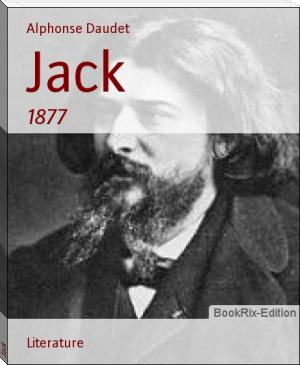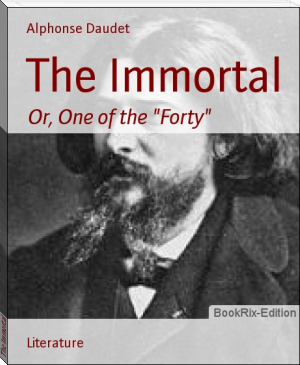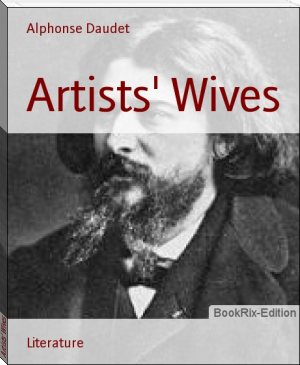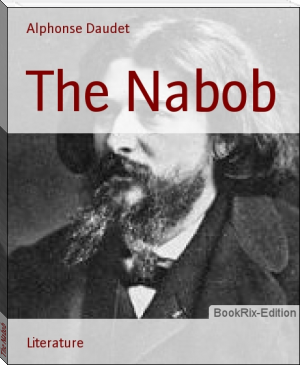Jack - Alphonse Daudet (inspirational books .TXT) 📗

- Author: Alphonse Daudet
Book online «Jack - Alphonse Daudet (inspirational books .TXT) 📗». Author Alphonse Daudet
not discovered until the ship was in the middle of the Gulf of Lyons. Any other child would have been kept on board; but when Madou's name was known, the captain took his royal Highness back to Marseilles, relying on a reward.
After that, the boy became more and more unhappy, for he was kept a very close prisoner. Notwithstanding all this, he escaped once more; and this time, on being discovered, made no resistance, but obeyed so gently, and with such a sad smile, that no one had the heart to punish him. At last the principal of the institution declined the responsibility of so determined a pupil. Should he send the little prince back to Dahomey? M. Bonfils dared not permit this, fearing thereby to lose the good graces of the king. In the midst of these perplexities Moronvol's advertisement appeared, and the prince was at once dispatched to 23 Avenue Montaigne,--"the most beautiful situation in Paris,"--where he was received, as you may well believe, with open arms. This heir of a far-off kingdom was a godsend to the academy. He was constantly on exhibition; M. Moronval showed him at theatres and concerts, and along the boulevards, reminding one of those perambulating advertisements that are to be seen in all large cities.
He appeared in society, such society at least as admitted M. Moronval, who entered a room with all the gravity of Fenelon conducting the Duke of Burgundy. The two were announced as "His Royal Highness the Prince of Dahomey, and M. Moronval, his tutor."
For a month the newspapers were full of anecdotes of Madou; an attache of a London paper was sent to interview him, and they had a long and serious talk as to the course the young prince should pursue when called to the throne of his ancestors. The English journal published an account of the curious dialogue, and the vague replies certainly left much to be desired.
At first all the expenses of the academy were discharged by this solitary pupil, Monsieur Bonfils paying the bill that was presented to him without a word of dispute. Madou's education, however, made but little progress. He still continued among the A B C's, and Madame Moronval's charming method made no impression upon him. His defective pronunciation was still retained, and his half-childish way of speaking was not changed. But he was gay and happy. All the other children were compelled to yield to him a certain deference. At first this was a difficult matter, as his intense blackness seemed to indicate to these other children of the sun that he was a slave.
And how amiable the professors were to this bullet-headed boy, who, in spite of his natural amiability, so sturdily refused to profit by their instructions! Every one of the teachers had his own private idea of what could be done in the future under the patronage of this embryo king. It was the refrain of all their conversations. As soon as Madou was crowned, they would all go to Dahomey. Labassandre intended to develop the musical taste of Dahomey, and saw himself the director of a conservatory, and at the head of the Royal Chapel.
Madame Moronval meant to apply her method to class upon class of crisp black heads. But Dr. Hirsch saw innumerable beds in a hospital, upon the inmates of which he could experiment without fear of any interference from the police. The first few weeks, therefore, of his sojourn at Paris seemed to Madou very sweet. If only the sun would shine out brightly, if the fine rain would cease to fall, or the thick fog clear away; if, in short, the boy could once have been thoroughly warm, he would have been content; and if Kerika, with her gun and her bow, her arms covered with clanking bracelets, could occasionally have appeared in the _Passage des Douze Maison_, he would have been very happy.
But Destiny altered all this. M. Bonfils arrived suddenly one day, bringing most disastrous news of Dahomey. The king was dethroned, taken prisoner by the Ashantees, who meant to found a new dynasty. The royal troops and the regiment of Amazons had all been conquered and dispersed. Kerika alone was saved, and she dispatched M. Bonfils to Madou to tell him to remain in France, and to take good care of his Gri-gri, for it was written in the great book that if Madou did not lose that amulet, he would come into his kingdom. The poor little king was in great trouble. Moronval, who placed no faith in the _gri-gri_, presented his bill--and such a bill!--to M. Bonfils, who paid it, but informed the principal that in future, if he consented to keep Madou, he must not rely upon any present compensation, but upon the gratitude of the king as soon as the fortunes and chances of war should restore him to his throne. Would the principal oblige M. Bonfils by at once signifying his intentions? Moronval promptly and nobly said, "I will keep the child." Observe that it was no longer "his Royal Highness." And the boy at once became like all the other scholars, and was scolded and punished as they were,--more, in fact, for the professors were out of temper with him, feeling apparently, that they had been deluded by false pretences. The child could understand little of this, and tried in vain all the gentle ways that had seemed to win so much affection before. It was worse still the next quarter, when Moronval, receiving no money, realized that Madou was a burden to him. He dismissed the servant, and installed Madou in his place, not without a scene with the young prince. The first time a broom was placed in his hands and its use explained to him, Madou obstinately refused. But M. Moronval had an irresistible argument ready, and after a heavy caning the boy gave up. Besides, he preferred to sweep rather than to learn to read. The prince, therefore, scrubbed and swept with singular energy, and the salon of the Moronvals was scrupulously clean; but Moronval's heart was not softened. In vain did the little fellow work; in vain did he seek to obtain a kindly word from his master; in vain did he hover about him with all the touching humility of a submissive hound: he rarely obtained any other recompense than a blow.
The boy was in despair. The skies grew grayer and grayer, the rain seemed to fall more persistently, and the snow was colder than ever.
O Kerika! Aunt Kerika! so haughty and so tender, where are you? Come and see what they are doing with your little king! How he is treated, how scantily he is fed, how ragged are his clothes, and how cold he is! He has but one suit now, and that a livery--a red coat and striped vest! Now, when he goes out with his master, he does not walk at his side--he follows him.
Madou's honesty and ingenuity had, however, so won the confidence of Madame Moronval, that she sent him to market. Behold, therefore, this last descendant of the powerful _Tocodonon_, the founder of the Dahomian dynasty, staggering daily from the market under the weight of a huge basket, half fed and half clothed, cold to the very heart; for nothing warms him now, neither violent exercise, nor blows, nor the shame of having become a servant; nor even his hatred of "the father with a stick," as he called Moronval.
And yet that hatred was something prodigious; and Madou confided to Jack his projects of vengeance.
"When Madou goes home to Dahomey, he will write a little letter to the father with the stick; he will tell him to come to Dahomey, and he will cut off his head into the copper basin, and afterwards will cover a big drum with his skin, and I will then march against the Ashantees,--Boum! boum! boum!"
Jack could just see in the shadow the gleam of the negro's white eyes, and heard the raps upon the footboard of the bed, that imitated the drum, and was frightened. He fancied that he heard the whizzing of the sabres, and the heavy thud of the falling heads; he pulled the blanket over his head, and held his breath.
Madou, who was excited by his own story, wished to talk on, but he thought his solitary auditor asleep. But when Jack drew a long breath, Madou said gently, "Shall we talk some more, sir?"
"Yes," answered Jack; "only don't let us say any more about that drum, nor the copper basin." The negro laughed silently. "Very well, sir; Madou won't talk--you must talk now. What is your name?"
"Jack, with a _k_. Mamma thinks a great deal about that--"
"Is your mamma very rich?"
"Rich! I guess she is," said Jack, by no means unwilling to dazzle Madou in his turn. "We have a carriage, a beautiful house on the boulevard, horses, servants, and all. And then you will see, when mamma comes here, how beautiful she is. Everybody in the street turns to look at her, she has such beautiful dresses and such jewels. We used to live at Tours; it was a pretty place. We walked in the Rue Royale, where we bought nice cakes, and where we met plenty of officers in uniform. The gentlemen were all good to me. I had Papa Leon, and Papa Charles,--not real papas, you know, because my own father died when I was a little fellow. When we first went to Paris I did not like it; I missed the trees and the country; but mamma petted me so much, and was so good to me, that I was soon happy again. I was dressed like the little English boys, and my hair was curled, and every day we went to the Bois. At last my mamma's old friend said that I ought to learn something; so mamma took me to the Jesuit College--"
Here Jack stopped suddenly. To say that the Fathers would not receive him, wounded his self-love sorely. Notwithstanding the ignorance and innocence of his age, he felt that there was something humiliating to his mother in this avowal, as well as to himself; and then this recital, on which he had so heedlessly entered, carried him back to the only serious trouble of his life. Why had they not been willing to receive him? why did his mother weep? and why did the Superior pity him?
"Say, then, little master," asked the negro suddenly, "what is a cocotte?"
"A cocotte?" asked Jack in astonishment. "I don't know. Is it a chicken?"
"I heard the father with a stick say to Madame Moronval that your mother was a cocotte."
"What an ideal. You misunderstood," and at the thought of his mother being a hen, with feathers, wings, and claws, the boy began to laugh; and Madou, without knowing why, followed his example.
This gayety soon obliterated the painful impressions of their previous conversation, and the two little, lonely fellows, after having confided to each other all their sorrows, fell asleep with smiles on their lips.
CHAPTER IV.~~THE REUNION.
Children are like grown people,--the experiences of others are never of any use to them.
Jack had been terrified by Madou's story, but he thought of it only as a frightful tale, or a bloody battle seen at the theatre. The first months were so happy at the academy, every one was so kind, that he forgot that Madou for a time had been equally happy.
At table he occupied the next seat to Moronval, drank his wine, shared his dessert; while the other children, as soon as the cakes and fruit appeared, rose abruptly from the table. Opposite Jack sat Dr. Hirsch, whose finances, to judge from his appearance, were in a most deplorable condition. He enlivened the repast by all sorts of scientific
After that, the boy became more and more unhappy, for he was kept a very close prisoner. Notwithstanding all this, he escaped once more; and this time, on being discovered, made no resistance, but obeyed so gently, and with such a sad smile, that no one had the heart to punish him. At last the principal of the institution declined the responsibility of so determined a pupil. Should he send the little prince back to Dahomey? M. Bonfils dared not permit this, fearing thereby to lose the good graces of the king. In the midst of these perplexities Moronvol's advertisement appeared, and the prince was at once dispatched to 23 Avenue Montaigne,--"the most beautiful situation in Paris,"--where he was received, as you may well believe, with open arms. This heir of a far-off kingdom was a godsend to the academy. He was constantly on exhibition; M. Moronval showed him at theatres and concerts, and along the boulevards, reminding one of those perambulating advertisements that are to be seen in all large cities.
He appeared in society, such society at least as admitted M. Moronval, who entered a room with all the gravity of Fenelon conducting the Duke of Burgundy. The two were announced as "His Royal Highness the Prince of Dahomey, and M. Moronval, his tutor."
For a month the newspapers were full of anecdotes of Madou; an attache of a London paper was sent to interview him, and they had a long and serious talk as to the course the young prince should pursue when called to the throne of his ancestors. The English journal published an account of the curious dialogue, and the vague replies certainly left much to be desired.
At first all the expenses of the academy were discharged by this solitary pupil, Monsieur Bonfils paying the bill that was presented to him without a word of dispute. Madou's education, however, made but little progress. He still continued among the A B C's, and Madame Moronval's charming method made no impression upon him. His defective pronunciation was still retained, and his half-childish way of speaking was not changed. But he was gay and happy. All the other children were compelled to yield to him a certain deference. At first this was a difficult matter, as his intense blackness seemed to indicate to these other children of the sun that he was a slave.
And how amiable the professors were to this bullet-headed boy, who, in spite of his natural amiability, so sturdily refused to profit by their instructions! Every one of the teachers had his own private idea of what could be done in the future under the patronage of this embryo king. It was the refrain of all their conversations. As soon as Madou was crowned, they would all go to Dahomey. Labassandre intended to develop the musical taste of Dahomey, and saw himself the director of a conservatory, and at the head of the Royal Chapel.
Madame Moronval meant to apply her method to class upon class of crisp black heads. But Dr. Hirsch saw innumerable beds in a hospital, upon the inmates of which he could experiment without fear of any interference from the police. The first few weeks, therefore, of his sojourn at Paris seemed to Madou very sweet. If only the sun would shine out brightly, if the fine rain would cease to fall, or the thick fog clear away; if, in short, the boy could once have been thoroughly warm, he would have been content; and if Kerika, with her gun and her bow, her arms covered with clanking bracelets, could occasionally have appeared in the _Passage des Douze Maison_, he would have been very happy.
But Destiny altered all this. M. Bonfils arrived suddenly one day, bringing most disastrous news of Dahomey. The king was dethroned, taken prisoner by the Ashantees, who meant to found a new dynasty. The royal troops and the regiment of Amazons had all been conquered and dispersed. Kerika alone was saved, and she dispatched M. Bonfils to Madou to tell him to remain in France, and to take good care of his Gri-gri, for it was written in the great book that if Madou did not lose that amulet, he would come into his kingdom. The poor little king was in great trouble. Moronval, who placed no faith in the _gri-gri_, presented his bill--and such a bill!--to M. Bonfils, who paid it, but informed the principal that in future, if he consented to keep Madou, he must not rely upon any present compensation, but upon the gratitude of the king as soon as the fortunes and chances of war should restore him to his throne. Would the principal oblige M. Bonfils by at once signifying his intentions? Moronval promptly and nobly said, "I will keep the child." Observe that it was no longer "his Royal Highness." And the boy at once became like all the other scholars, and was scolded and punished as they were,--more, in fact, for the professors were out of temper with him, feeling apparently, that they had been deluded by false pretences. The child could understand little of this, and tried in vain all the gentle ways that had seemed to win so much affection before. It was worse still the next quarter, when Moronval, receiving no money, realized that Madou was a burden to him. He dismissed the servant, and installed Madou in his place, not without a scene with the young prince. The first time a broom was placed in his hands and its use explained to him, Madou obstinately refused. But M. Moronval had an irresistible argument ready, and after a heavy caning the boy gave up. Besides, he preferred to sweep rather than to learn to read. The prince, therefore, scrubbed and swept with singular energy, and the salon of the Moronvals was scrupulously clean; but Moronval's heart was not softened. In vain did the little fellow work; in vain did he seek to obtain a kindly word from his master; in vain did he hover about him with all the touching humility of a submissive hound: he rarely obtained any other recompense than a blow.
The boy was in despair. The skies grew grayer and grayer, the rain seemed to fall more persistently, and the snow was colder than ever.
O Kerika! Aunt Kerika! so haughty and so tender, where are you? Come and see what they are doing with your little king! How he is treated, how scantily he is fed, how ragged are his clothes, and how cold he is! He has but one suit now, and that a livery--a red coat and striped vest! Now, when he goes out with his master, he does not walk at his side--he follows him.
Madou's honesty and ingenuity had, however, so won the confidence of Madame Moronval, that she sent him to market. Behold, therefore, this last descendant of the powerful _Tocodonon_, the founder of the Dahomian dynasty, staggering daily from the market under the weight of a huge basket, half fed and half clothed, cold to the very heart; for nothing warms him now, neither violent exercise, nor blows, nor the shame of having become a servant; nor even his hatred of "the father with a stick," as he called Moronval.
And yet that hatred was something prodigious; and Madou confided to Jack his projects of vengeance.
"When Madou goes home to Dahomey, he will write a little letter to the father with the stick; he will tell him to come to Dahomey, and he will cut off his head into the copper basin, and afterwards will cover a big drum with his skin, and I will then march against the Ashantees,--Boum! boum! boum!"
Jack could just see in the shadow the gleam of the negro's white eyes, and heard the raps upon the footboard of the bed, that imitated the drum, and was frightened. He fancied that he heard the whizzing of the sabres, and the heavy thud of the falling heads; he pulled the blanket over his head, and held his breath.
Madou, who was excited by his own story, wished to talk on, but he thought his solitary auditor asleep. But when Jack drew a long breath, Madou said gently, "Shall we talk some more, sir?"
"Yes," answered Jack; "only don't let us say any more about that drum, nor the copper basin." The negro laughed silently. "Very well, sir; Madou won't talk--you must talk now. What is your name?"
"Jack, with a _k_. Mamma thinks a great deal about that--"
"Is your mamma very rich?"
"Rich! I guess she is," said Jack, by no means unwilling to dazzle Madou in his turn. "We have a carriage, a beautiful house on the boulevard, horses, servants, and all. And then you will see, when mamma comes here, how beautiful she is. Everybody in the street turns to look at her, she has such beautiful dresses and such jewels. We used to live at Tours; it was a pretty place. We walked in the Rue Royale, where we bought nice cakes, and where we met plenty of officers in uniform. The gentlemen were all good to me. I had Papa Leon, and Papa Charles,--not real papas, you know, because my own father died when I was a little fellow. When we first went to Paris I did not like it; I missed the trees and the country; but mamma petted me so much, and was so good to me, that I was soon happy again. I was dressed like the little English boys, and my hair was curled, and every day we went to the Bois. At last my mamma's old friend said that I ought to learn something; so mamma took me to the Jesuit College--"
Here Jack stopped suddenly. To say that the Fathers would not receive him, wounded his self-love sorely. Notwithstanding the ignorance and innocence of his age, he felt that there was something humiliating to his mother in this avowal, as well as to himself; and then this recital, on which he had so heedlessly entered, carried him back to the only serious trouble of his life. Why had they not been willing to receive him? why did his mother weep? and why did the Superior pity him?
"Say, then, little master," asked the negro suddenly, "what is a cocotte?"
"A cocotte?" asked Jack in astonishment. "I don't know. Is it a chicken?"
"I heard the father with a stick say to Madame Moronval that your mother was a cocotte."
"What an ideal. You misunderstood," and at the thought of his mother being a hen, with feathers, wings, and claws, the boy began to laugh; and Madou, without knowing why, followed his example.
This gayety soon obliterated the painful impressions of their previous conversation, and the two little, lonely fellows, after having confided to each other all their sorrows, fell asleep with smiles on their lips.
CHAPTER IV.~~THE REUNION.
Children are like grown people,--the experiences of others are never of any use to them.
Jack had been terrified by Madou's story, but he thought of it only as a frightful tale, or a bloody battle seen at the theatre. The first months were so happy at the academy, every one was so kind, that he forgot that Madou for a time had been equally happy.
At table he occupied the next seat to Moronval, drank his wine, shared his dessert; while the other children, as soon as the cakes and fruit appeared, rose abruptly from the table. Opposite Jack sat Dr. Hirsch, whose finances, to judge from his appearance, were in a most deplorable condition. He enlivened the repast by all sorts of scientific
Free e-book «Jack - Alphonse Daudet (inspirational books .TXT) 📗» - read online now
Similar e-books:





Comments (0)